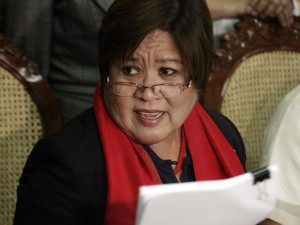DOJ orders criminal raps vs bank exec
MANILA, Philippines—The Department of Justice (DOJ) has ordered the filing of criminal charges against an official of the Standard Chartered Bank Philippines for allegedly making false assertions before the court by deliberately withholding information that the bank had gotten collateral for its loan to a local firm.
In an 18-page resolution dated Sept. 16 but released to the media only Friday, DOJ prosecution attorney Caterina Isabel Caeg ruled that there was probable cause for the filing of a perjury case against Kathrina Sebastian, Standard Chartered’s associate director for origination and client coverage, who was the subject of a complaint filed last December by the Philippine Investment Two Inc. (PI Two).
The case was originally filed before the Makati City Prosecutor’s office but Justice Secretary Leila De Lima issued a department order last May transferring the preliminary investigation to the DOJ main office.
“After a careful examination of the evidence on record, the undersigned finds probable cause to indict respondent Sebastian for perjury under Article 183 of the Revised Penal Code for willfully and deliberately making the following false statement in Standard Chartered’s comment on the petition: ‘The fact that PI Two was not able to furnish adequate guarantees or security in exchange for the inadequate LBHI guaranty,’” Caeg ruled.
The case stemmed from the perjury case filed by PI Two, the local affiliate of the defunct United States investment firm Lehman Brothers Holdings Inc., against Sebastian.
In 2007, Standard Chartered lent P819 million to PI Two. After Lehman Brothers filed for bankruptcy in New York City in September 2008, the Makati Regional Trial Court Branch 149 under Judge Cesar Untalan became the rehabilitation court to ensure payment of PI Two’s debts to creditors, including Standard Chartered and Metrobank.
However, PI Two and Metrobank found out that Sebastian signed Standard Chartered’s comment on the rehabilitation suit, deliberately withholding the fact that the bank had already received more than enough collateral for a loan that it gave to PI Two, thus adversely affecting the firm and its other creditors.
PI Two and Metrobank told the RTC that they had discovered that before Lehman Brothers declared bankruptcy, Standard Chartered had received some $90 million in bonds as collateral from LBHI, and was negotiating a settlement in New York for the same loan that it was already being paid for under PI Two’s local rehabilitation plan.
In effect, they said Standard Chartered was seeking payment twice for the same loan, here and in New York.
Last Aug. 30, Untalan ordered Standard Chartered to return to PI Two the P233.6 million which the bank got from the court’s rehabilitation plan upon finding out that the bank had already signed a settlement agreement in New York for the entire P819-million loan.
As it turned out, the bank had secured the P819 million with Lehman Brothers’ high-grade securities worth $90 million in bonds, which the bank reportedly later sold, returning the $64 million in excess proceeds back to the investment firm.
Caeg, in her ruling, said there was “deliberate concealment” on Sebastian’s part regarding the existence of the settlement agreement involving the $90 million collateral. This allegedly allowed Sebastian to “willfully and falsely declare” in the bank’s comment on the petition that the guarantee securing PI Two’s loan was “inadequate.”
Caeg added that Standard Chartered’s failure to divulge the collateral had prejudiced PI Two and its other creditors.

